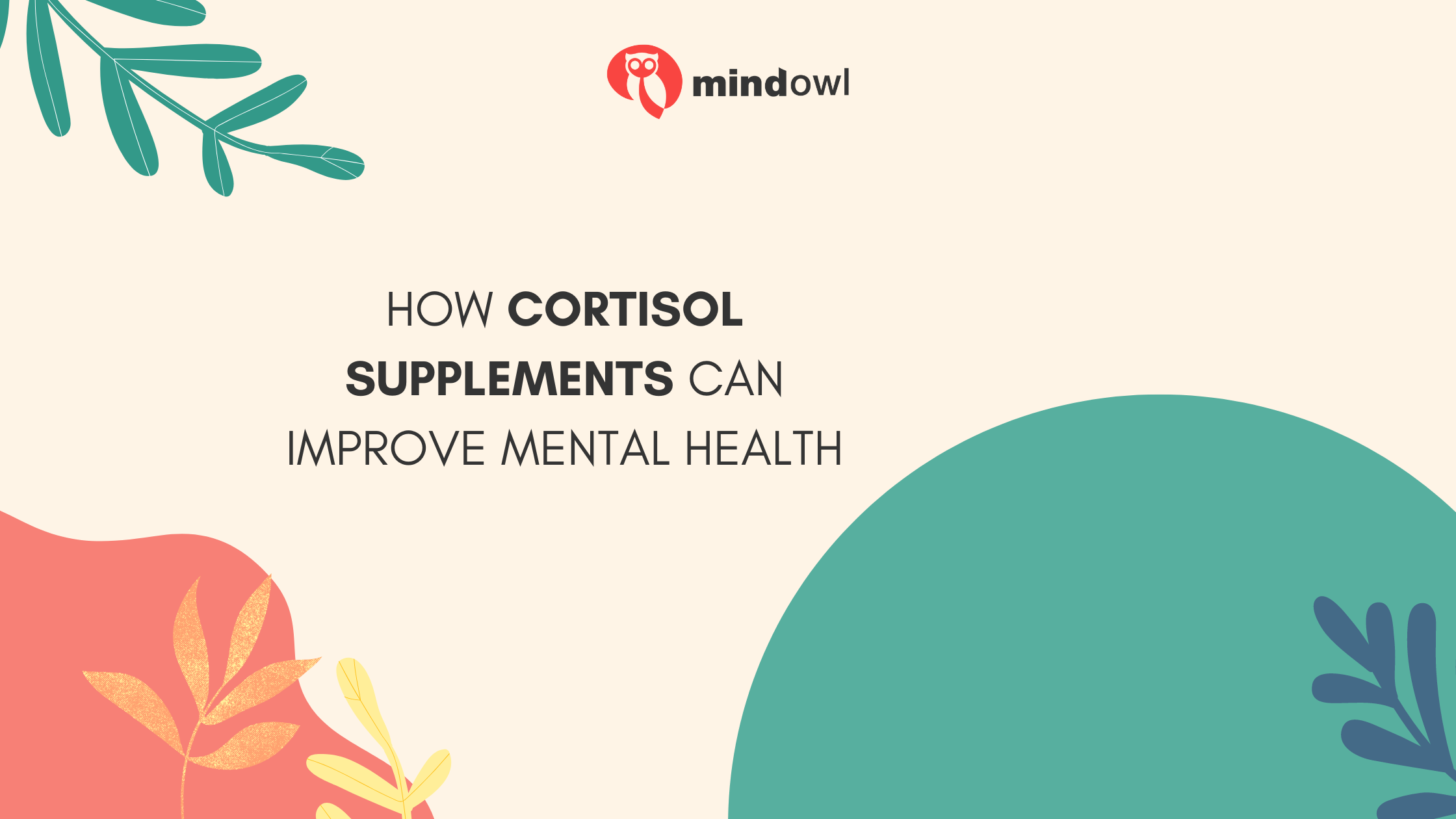With our fast-paced lives, it’s common to feel overwhelmed. Stress can affect how we think, feel, and act. A key player in this scenario is cortisol – our body’s stress hormone.
Too much or too little of it can make things worse.
Cortisol isn’t all bad; it keeps us awake and alert during the day. But when levels stay high for too long, it’s a problem. That’s where cortisol supplements come into play for better mental health.
This article will show you how they work and other ways to keep your stress in check—a must-read for anyone looking to bring balance back to their life!
Understanding Cortisol and Its Role in Stress
Cortisol, a hormone produced by the adrenal glands, plays a crucial role in the body’s stress response. It helps regulate blood pressure, decrease inflammation, and manage how the body uses macronutrients.
What is Cortisol?
Cortisol is a hormone discharged by your adrenal glands, located atop your kidneys. This hormone has an integral function in controlling how your body utilises carbohydrates, fats, and proteins.
It also aids in moderating stress levels within the body and managing blood pressure.
When confronting stress or peril, cortisol levels escalate. This surge provides your body with the requisite energy to tackle the problem. However, having an excess of cortisol over a period can lead to health complications such as elevated blood pressure and obesity.
Hence, maintaining a balance of cortisol is important for both psychological and physiological health.
How Does Cortisol Affect the Body?
Cortisol, often acknowledged as the stress hormone, has a fundamental role in our body’s stress response. Its levels rise during stress, priming your body to handle challenges. The hormone increases your vitality by enhancing sugar levels in your bloodstream and improving your brain’s glucose utilisation.
Furthermore, it reduces processes that may be unnecessary or harmful in a stress-response situation, like immune system responses.
Continual high cortisol levels can disrupt your body, potentially leading to health complications such as heart disease, weight gain, elevated blood pressure, and disturbed sleep patterns.
Adopting stress management methods—such as consistent physical activity or mindfulness practices—and maintaining a balanced diet can be effective in managing healthy cortisol levels.
Supplements like omega-3 fatty acids can also help in minimising high cortisol levels, promoting overall health.

Supplements to Balance Cortisol
Some supplements to reduce cortisol are ashwagandha, omega-3 fatty acids, magnesium, and probiotics can help in managing cortisol levels. These natural remedies provide support for mental and physical well-being by aiding in the regulation of cortisol.
Ashwagandha
Ashwagandha, a powerful herb from the Withania somnifera plant, has been used for centuries in traditional medicine. It acts as an adaptogen, helping the body manage stress more effectively.
This supplement can lower your cortisol levels and support mental well-being. Many find it helps reduce anxiety and improve energy levels without causing drowsiness.
Research shows that taking Ashwagandha consistently might decrease stress and anxiety in people by regulating chemical signaling in the nervous system. Besides its benefits for mental health, it also contributes to better physical health by improving muscle strength and reducing inflammation.
Ashwagandha proves nature’s prowess in fostering resilience against stress.
Omega-3 Fatty Acids
Omega-3 fatty acids are potent nutrients housed within fish such as salmon and mackerel. They command a significant position in lessening inflammation throughout the body. This process aids in decreasing cortisol levels, making them proficient in managing stress.
Numerous research pieces indicate that omega-3 supplements may diminish the possibility of heightened cortisol due to chronic stress.
Ingesting these supplements can buttress your mental well-being too. They assist in enhancing mood and brain operation, which is paramount when one is under duress. For optimal effect, incorporating foods abundant in omega-3s within a health-conscious diet is prudent.

Magnesium
Magnesium holds a significant position in managing stress levels. It aids in soothing the nervous system, which is necessary for maintaining decreased cortisol levels. Research has indicated that magnesium can assist in diminishing anxiety, effectively supporting your mental well-being.
This mineral is necessary for many bodily processes, including regulating muscle and nerve function, protein synthesis, and blood sugar management.
Utilising magnesium supplements may assist in naturally lowering cortisol. Individuals with a lack of magnesium often endure increased anxiety and stress levels. By amplifying your intake through diet or supplementation, you could witness an enhancement in sleep quality too.
Excellent sources incorporate leafy greens, nuts, seeds, and whole grains. If pondering about supplements to lower cortisol, conferring with a health care provider first is advisable.
Probiotics
Probiotics consist of small, beneficial bacteria that reside in your gut. Their primary function is to alleviate stress and manage cortisol levels. These advantageous microorganisms assist in maintaining your digestive system’s equilibrium, which is directly associated with your mood and mental health.
Consuming probiotics in supplement form can aid your mental health by preserving the health of the gut-brain axis. This implies they help in maintaining a happy digestive tract and also support brain health by potentially reducing stress hormones like cortisol.
Research indicates that individuals who consume probiotic supplements tend to experience less stress and feel more at ease. Why is that? Probiotics might minimise inflammation – a deterrent of brain health – and hence decrease raised cortisol levels resulting from chronic stress.
Including probiotic-rich foods or choosing a daily supplement could be an uncomplicated yet effective method to enhance both physical and mental health conditions.
Integrating probiotics into our dietary regimen assists in nurturing our second brain—the gut—hence positively impacting our overall well-being.
Negative Effects of Imbalanced Cortisol Levels
Physical Effects of High Cortisol
High cortisol levels can lead to trouble all over the body. It might make you gain weight, especially around your stomach. This hormone can also push your blood sugar up and get in the way of how insulin works, which could put you at risk for type 2 diabetes.
Your muscles could get weaker too.
Your skin might not look its best either; high cortisol can cause acne or other skin issues. Bones become less dense, making breaks more likely. You may face higher blood pressure and a bigger chance of heart problems down the line.
Plus, it messes with gut health, often leading to discomfort or bloating.
Mental and Emotional Impact
High levels of cortisol can significantly impact mental and emotional well-being. Elevated cortisol can lead to increased feelings of anxiety, irritability, and even depression. These imbalanced cortisol levels can also disrupt sleep patterns and lead to chronic fatigue, affecting mood and cognitive function.
Moreover, extended exposure to high cortisol levels can impair the brain’s ability to regulate emotions effectively. Individuals dealing with elevated cortisol often struggle with managing stress and may find themselves overwhelmed by everyday challenges.
This dysregulation can impede their ability to focus, concentrate, and make clear decisions in various situations.
Elevated cortisol levels not only affect mental health but also take a toll on emotional resilience.
Benefits of Managing Cortisol Levels
Enhanced Mental Health
Furthermore, it is crucial to note that maintaining balanced cortisol levels is essential for supporting both mental and physical health. Effectively managing cortisol can aid in decreasing stress and anxiety, resulting in increased energy levels and better mood.
Prioritising good quality sleep, practising mindfulness, and engaging in regular physical activity are important lifestyle habits that contribute to stress management. In addition, specific supplements such as Ashwagandha, Omega-3 Fatty Acids, magnesium, and probiotics can help in reducing cortisol levels and lowering the risk of chronic conditions associated with high cortisol.
It should be noted that high cortisol levels have been associated with adverse health effects, including cardiovascular disease and psychological stress. Therefore, it is vital to take steps to manage this hormone for overall well-being.
By lowering cortisol levels through lifestyle adjustments and suitable supplementation, individuals can enhance their mental resilience and address the detrimental effects of imbalanced cortisol on emotional regulation.
Improved Physical Well-being
Balancing cortisol levels can significantly benefit physical well-being. It may help reduce the risk of issues associated with high cortisol, such as weight gain and high blood pressure.
Managing cortisol through supplements such as Omega-3 fatty acids and magnesium could potentially lead to improved energy levels and better overall health.
Participating in regular physical activity, prioritising quality sleep, and consuming a nutritious diet can also assist in maintaining cortisol levels. These lifestyle habits can contribute to an enhanced sense of physical well-being while supporting the body’s natural functions.
Lifestyle Changes to Support Cortisol Management
Prioritise Quality Sleep
Quality sleep is crucial for managing cortisol levels and reducing stress. Aim for 7-9 hours of uninterrupted sleep each night. Establish a calming bedtime routine and ensure your sleeping environment is comfortable and conducive to rest.
Avoid caffeine, screens, and heavy meals before bedtime as they can disrupt your sleep quality. Quality sleep supports mental resilience, overall well-being, and cortisol regulation.
Bear in mind to make adjustments in lifestyle habits that support quality sleep—dim the lights in the evening, limit screen time before bed, establish a regular sleep schedule, and create a relaxing pre-sleep ritual.
Incorporating these changes can significantly enhance the quality of your sleep and contribute to better cortisol management and reduced stress levels.
Practice Mindfulness Techniques
Engage in simple mindfulness activities like deep breathing, meditation, or body scanning to calm your mind and reduce stress. Pay attention to the present moment without judgment and reap the benefits of improved mental well-being.
Embracing mindfulness can help lower cortisol levels and alleviate anxiety, contributing to a more balanced and peaceful state of mind.
Through practising mindfulness techniques such as meditation and deep breathing exercises, you can effectively manage cortisol levels, promoting a sense of calmness and reducing anxiety.
By embracing these strategies in your daily routine, you can enhance your mental health while lowering stress hormones naturally.
Engage in Regular Physical Activity
Regular physical activity plays an essential role in managing cortisol levels and promoting overall well-being. Exercise, such as aerobic activities, strength training, and yoga, can help reduce cortisol production and release in the body.
This decrease in cortisol levels is linked to improved mood and reduced stress. Furthermore, engaging in regular physical activity supports better sleep quality and aids in maintaining a healthy weight – both of which contribute to managing cortisol effectively.
Incorporating at least 30 minutes of moderate-intensity physical activity into your daily routine can significantly impact your cortisol levels. Activities like brisk walking, cycling, or swimming are great options to consider for reducing stress hormones while also benefiting cardiovascular health and muscle strength—key elements for a balanced lifestyle.
Bear in mind that consistent exercise not only helps manage cortisol but also contributes to an array of other health benefits such as improved mental clarity, enhanced mood regulation, and reduced anxiety symptoms—all factors that tie back to comprehensive mental health support.

FAQs on Cortisol Management
What foods help reduce cortisol levels?
Foods like dark chocolate, berries, and turmeric can aid in reducing cortisol levels. In addition, integrating foods rich in omega-3 fatty acids such as salmon, chia seeds, and walnuts into your diet can also help in lowering cortisol levels.
Besides, consuming probiotic-rich foods like yogurt and kefir may help support a healthy gut microbiome which is linked to lower stress hormone levels.
Integrating whole grains such as oats or quinoa into meals can contribute to stable blood sugar levels and potentially reduce cortisol production. Moreover, consuming antioxidant-packed fruits like oranges and papaya alongside green tea could also help in lowering cortisol levels due to their anti-inflammatory properties.
How does physical activity influence cortisol?
Physical activity, such as exercise or sports, can reduce cortisol levels in the body. When you engage in regular physical activity, whether it’s jogging, swimming, or playing a sport like football or tennis, your body releases endorphins which act as natural stress fighters.
Endorphins help to regulate cortisol production and decrease its levels in the bloodstream. This leads to a more balanced response to stress and promotes overall well-being.
So get moving! Even simple activities like walking briskly or cycling can have a positive impact on your cortisol levels and help manage stress effectively. Incorporating moderate-intensity physical activities into your daily routine can significantly aid cortisol regulation and improve mental health.
Can supplements alone manage cortisol effectively?
Supplements can help manage cortisol effectively, but they work best when combined with lifestyle changes. Ashwagandha, omega-3 fatty acids, magnesium, and probiotics are some supplements that may help reduce cortisol levels.
However, supporting these efforts by prioritising quality sleep, practicing mindfulness techniques, and engaging in regular physical activity is vital to achieve optimal results for managing cortisol.
Additionally, dietary habits play a crucial role in influencing cortisol levels; thus, consuming a healthy diet rich in nutrients such as vitamins and omega-3 supplements can contribute to reducing the stress hormone cortisol effectively.
Conclusion
To sum up, managing cortisol levels through supplements and lifestyle changes is essential for mental health. Balancing cortisol with supplements like Ashwagandha, Omega-3 Fatty Acids, and Magnesium can help reduce stress and anxiety.
Lifestyle adjustments such as quality sleep, mindfulness practices, and regular exercise are also vital in supporting cortisol management. By incorporating these strategies into daily life, individuals can improve their mental well-being and lead healthier lifestyles overall.
MindOwl Founder – My own struggles in life have led me to this path of understanding the human condition. I graduated with a bachelor’s degree in philosophy before completing a master’s degree in psychology at Regent’s University London. I then completed a postgraduate diploma in philosophical counselling before being trained in ACT (Acceptance and commitment therapy).
I’ve spent the last eight years studying the encounter of meditative practices with modern psychology.

